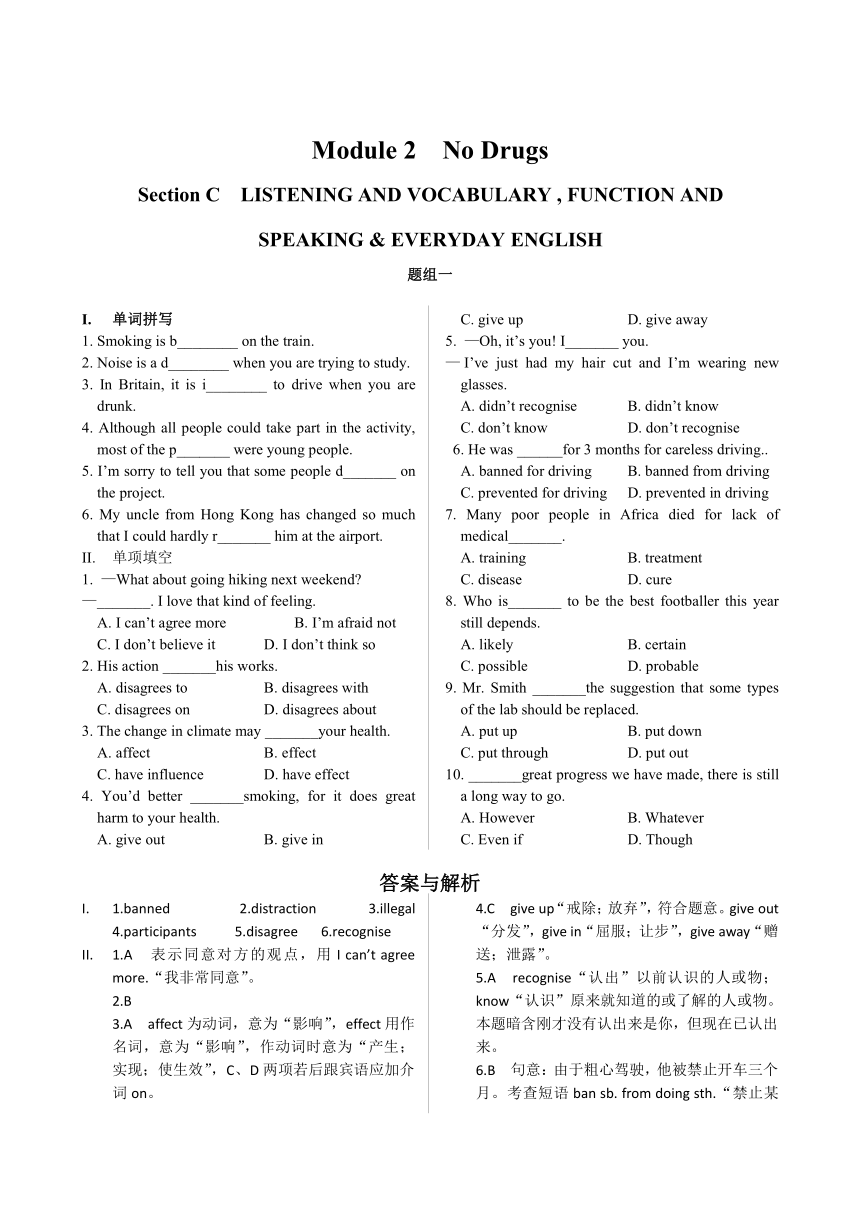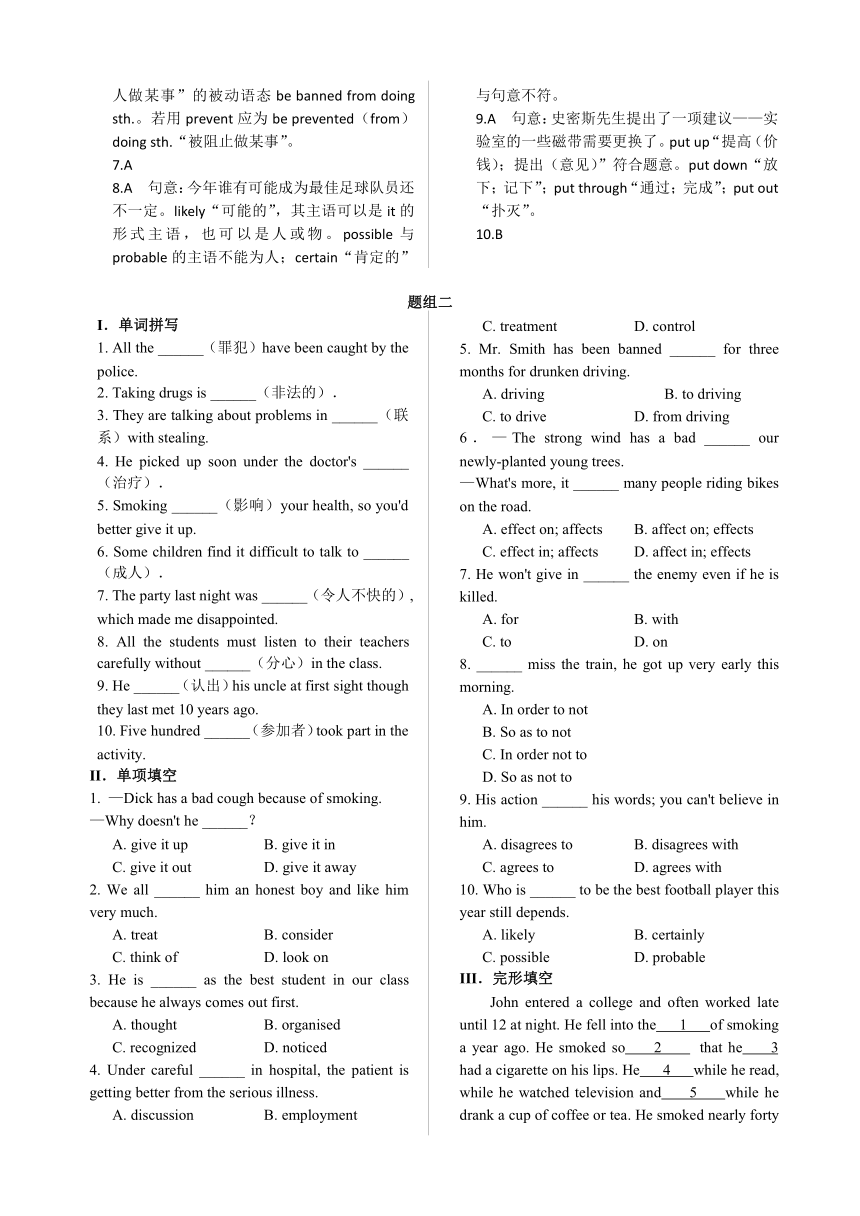2013-2014学年高一英语外研版必修二Module 2 Section C 同步练测(含答案解析)
文档属性
| 名称 | 2013-2014学年高一英语外研版必修二Module 2 Section C 同步练测(含答案解析) |  | |
| 格式 | zip | ||
| 文件大小 | 23.4KB | ||
| 资源类型 | 教案 | ||
| 版本资源 | 外研版 | ||
| 科目 | 英语 | ||
| 更新时间 | 2014-02-17 15:08:34 | ||
图片预览


文档简介
Module 2 No Drugs
Section C LISTENING AND VOCABULARY , FUNCTION AND SPEAKING & EVERYDAY ENGLISH
题组一
单词拼写
1. Smoking is b________ on the train.
2. Noise is a d________ when you are trying to study.
3. In Britain, it is i________ to drive when you are drunk.
4. Although all people could take part in the activity, most of the p_______ were young people.
5. I’m sorry to tell you that some people d_______ on the project.
6. My uncle from Hong Kong has changed so much that I could hardly r_______ him at the airport.
单项填空
1. —What about going hiking next weekend?
—_______. I love that kind of feeling.
A. I can’t agree more B. I’m afraid not
C. I don’t believe it D. I don’t think so
2. His action _______his works.
A. disagrees to B. disagrees with
C. disagrees on D. disagrees about
3. The change in climate may _______your health.
A. affect B. effect
C. have influence D. have effect
4. You’d better _______smoking, for it does great harm to your health.
A. give out B. give in
C. give up D. give away
5. —Oh, it’s you! I_______ you.
—I’ve just had my hair cut and I’m wearing new glasses.
A. didn’t recognise B. didn’t know
C. don’t know D. don’t recognise
6. He was ______for 3 months for careless driving..
A. banned for driving B. banned from driving
C. prevented for driving D. prevented in driving
7. Many poor people in Africa died for lack of medical_______.
A. training B. treatment
C. disease D. cure
8. Who is_______ to be the best footballer this year still depends.
A. likely B. certain
C. possible D. probable
9. Mr. Smith _______the suggestion that some types of the lab should be replaced.
A. put up B. put down
C. put through D. put out
10. _______great progress we have made, there is still a long way to go.
A. However B. Whatever
C. Even if D. Though
答案与解析
1.banned 2.distraction 3.illegal 4.participants 5.disagree 6.recognise
1.A 表示同意对方的观点,用I can’t agree more.“我非常同意”。
2.B
3.A affect为动词,意为“影响”,effect用作名词,意为“影响”,作动词时意为“产生;实现;使生效”,C、D两项若后跟宾语应加介词on。
4.C give up“戒除;放弃”,符合题意。give out“分发”,give in“屈服;让步”,give away“赠送;泄露”。
5.A recognise“认出”以前认识的人或物;know“认识”原来就知道的或了解的人或物。本题暗含刚才没有认出来是你,但现在已认出来。
6.B 句意:由于粗心驾驶,他被禁止开车三个月。考查短语ban sb. from doing sth.“禁止某人做某事”的被动语态be banned from doing sth.。若用prevent应为be prevented(from)doing sth.“被阻止做某事”。
7.A
8.A 句意:今年谁有可能成为最佳足球队员还不一定。likely“可能的”,其主语可以是it的形式主语,也可以是人或物。possible与probable的主语不能为人;certain“肯定的”与句意不符。
9.A 句意:史密斯先生提出了一项建议——实验室的一些磁带需要更换了。put up“提高(价钱);提出(意见)”符合题意。put down“放下;记下”;put through“通过;完成”;put out“扑灭”。
10.B
题组二
I.单词拼写
1. All the ______(罪犯)have been caught by the police.
2. Taking drugs is ______(非法的).
3. They are talking about problems in ______(联系)with stealing.
4. He picked up soon under the doctor's ______(治疗).
5. Smoking ______(影响)your health, so you'd better give it up.
6. Some children find it difficult to talk to ______(成人).
7. The party last night was ______(令人不快的), which made me disappointed.
8. All the students must listen to their teachers carefully without ______(分心)in the class.
9. He ______(认出)his uncle at first sight though they last met 10 years ago.
10. Five hundred ______(参加者)took part in the activity.
II.单项填空
1. —Dick has a bad cough because of smoking.
—Why doesn't he ______?
A. give it up B. give it in
C. give it out D. give it away
2. We all ______ him an honest boy and like him very much.
A. treat B. consider
C. think of D. look on
3. He is ______ as the best student in our class because he always comes out first.
A. thought B. organised
C. recognized D. noticed
4. Under careful ______ in hospital, the patient is getting better from the serious illness.
A. discussion B. employment
C. treatment D. control
5. Mr. Smith has been banned ______ for three months for drunken driving.
A. driving B. to driving
C. to drive D. from driving
6.—The strong wind has a bad ______ our newly-planted young trees.
—What's more, it ______ many people riding bikes on the road.
A. effect on; affects B. affect on; effects
C. effect in; affects D. affect in; effects
7. He won't give in ______ the enemy even if he is killed.
A. for B. with
C. to D. on
8. ______ miss the train, he got up very early this morning.
A. In order to not
B. So as to not
C. In order not to
D. So as not to
9. His action ______ his words; you can't believe in him.
A. disagrees to B. disagrees with
C. agrees to D. agrees with
10. Who is ______ to be the best football player this year still depends.
A. likely B. certainly
C. possible D. probable
III.完形填空
John entered a college and often worked late until 12 at night. He fell into the 1 of smoking a year ago. He smoked so 2 that he 3 had a cigarette on his lips. He 4 while he read, while he watched television and 5 while he drank a cup of coffee or tea. He smoked nearly forty cigarettes a day, but he was happy.
John's friend, Frank, 6 many times to 7 him not to smoke. "Smoking is bad for your 8 !"he said. "You'd better give it up." But his advice didn't 9 .
Before long, John found that he often got a hard and 10 cough, 11 he went to see a doctor. The doctor 12 him carefully and asked whether he often smoked. John told him the 13 . Then the doctor told him that his cough was 14 by smoking and he wouldn't get any better unless he stopped smoking.
"If not," said the doctor, “your cough will never be 15 and some other illnesses may also be caused.”
John became 16 and made up his mind to give up smoking. At the beginning, it was very 17 for him. Every 18 when he wanted to smoke, he got some other things to eat. At last, he was not 19 in smoking at all. And he no longer had 20 .
1. A. hole B. habit
C. interest D. love
2. A. much B. hard
C. fast D. thickly
3. A. still B. seldom
C. never D. always
4. A. stopped B. smoked
C. ate D. had
5. A. still B. just
C. even D. right
6. A. talked B. ordered
C. worked D. tried
7. A. advise B. tell
C. wish D. take
8. A work B. study
C. health D. life
9. A. continue B. work
C. reply D. answer
10. A. wet B. loud
C. dry D. rapid
11. A. but B. so
C. till D. as
12. A. saw B. felt
C. cured D. examined
13. A. truth B. reason
C. matter D. thing
14. A. shown B. kept
C. caused D. heard
15. A. stopped B. cured
C. repaired D. mended
16. A. angry B. sad
C. sorry D. worried
17. A. sick B. tired
C. difficult D. easy
18. A. day B. time
C. way D. place
19. A. seen B. told
C. happy D. interested
20. A. smokes B. problems
C. coughs D. cigarettes
IV.短文改错
假定英语课上老师要求同桌之间交换修改作文,请你修改你同桌写的以下作文。文中共有10处语言错误,每句中最多有两处,每处错误仅涉及一个单词的增加、删除或修改。
增加:在缺词处加一个漏字符号(∧),并在其下面写上该加的词。
删除:把多余的词用斜线(\)划掉。
修改:在错的词下划一横线,并在该词下面写上修改后的词。
注意:1.每处错误及其修改均仅限一词;
2.只允许修改10处,多者(从第11处起)不计分。
How nice to hear of you again. You want to know what is going on in our school. On short, things have been improving after the school began to carry out exploring study. In the past, the teachers keep on explaining the points. We just listened and took note. But now we discuss and solve the problems was raised by teachers or by us. After class, we enjoy all kinds of activity instead of doing endless homework. For example, we can read that we are interested in and go to the library or surf Internet for information.
答案与解析
I. 1.criminals 2.illegal 3.connection
4.treatment 5.affects 6.adults
7.horrible 8.distraction 9.recognised
10.participants
II. 1.A。give up意为“放弃;中止”,符合句意。代词it应放在give和up中间。give in意为“屈服,让步”,in为副词,其后不接宾语;give out意为“分发;耗尽”;give away意为“赠送;泄露”。
2.B。“把某人看作……”可以用treat…as,think of…as,look on…as,consider…as表达,但只有consider之后的as可以省略,故选B项。
3.C。句意:因为他考试总是得第一,他被公认为班上最好的学生。A项中thought之后应有介词of;organise意为“组织”;notice意为“注意到;认出”;recognise…as意为“承认……是……”,故选C。
4.C。discussion意为“讨论”;employment意为“雇佣”;treatment意为“治疗”;control意为“控制”,只有C符合题意,故选C。
5.D。考查ban sb. from doing sth.的被动结构。
6.A。have a bad effect on意为“对……有坏影响”,其中effect是名词;affect是动词,意为“影响”。
7.C。句意:即使他被杀,他也不会向敌人投降。give in to sb./sth.意为“向某人或某事屈服或投降”。
8.C。so as to不可用于句首,而 in order to可以,其否定形式是in order not to,故C项正确。
9.B。句意:他言行不一致,你不能相信他。根据句意可知,此处表示否定含义,可排除C、D两项。disagree with意为“不同意;和……不一致”。disagree to后接表“计划,建议,安排”的词。
10.A。句意:谁将成为今年的最佳足球运动员还说不准。be likely to do意为“有可能做”,主语可以是人。certainly是副词,可排除;possible和probable的主语多是形式主语it。
III. 1.B。fall into the habit of doing sth.是固定短语,意为“形成做某事的习惯”。
2.A。much修饰动词smoked。
3.D。因为前面有smoked so much,所以此处应是always,意为“嘴里老是叼着烟”。
4.B。由上下文可知,无论干什么,他都吸烟。
5.C。甚至喝咖啡或茶时,也抽烟。even意为“甚至”,表示程度。
6.D。try to do努力去做。
7.A。advise sb. to do sth.建议某人做某事。可根据下文中的“But his advice…”得出答案。
8.C。吸烟对健康有害。
9.B。work意为“起作用”。
10.C。dry cough意为“干咳”。
11.B。因为咳得厉害,所以去看医生。上下文之间为因果关系,用连词so。
12.D。examine sb.意为“给某人做检查”。cure sb.意为“治好某人”。
13.A。tell sb. the truth意为“告诉某人真相”。
14.C。医生说他的咳嗽是由吸烟引起的。cause意为“引起;使发生”。由下一段中的“some other illnesses may also be caused”可知答案。
15.B。cure意为“治愈”;repair和mend意为“修理”。
16.D。从上一段最后医生说的话可以判定,John有点担心。worried意为“担心的”。
17.C。一开始,戒烟很难。因为吸烟是他的习惯。
18.B。every time意为“每次”。句意:每次当他想吸烟时,他就……。
19.D。最后,他对吸烟一点也不感兴趣了。be interested in意为“对……感兴趣”。
20.C。由上下文可知咳嗽是由吸烟引起的,他戒烟后也就不再咳嗽了。
IV.1.把第一句中的of改为from。hear from sb.意为“收到某人的来信”。
2.把第三句中的On short改为In short。in short意为“简言之”。
3.把第三句中的after改为since。根据主句的时态是现在完成进行时,可知应用since引导时间状语从句。
4.把第四句中的keep改为kept。前面有表示过去的时间状语in the past,因此用一般过去时。
5.把第五句中的note改为notes。take notes意为“记笔记”,为固定短语。
6.把第六句中的was去掉。此处是过去分词短语作定语。
7.把第六句中的us改为ourselves。主语和宾语是同一人或物时,宾语用反身代词。
8.把倒数第二句中的activity改为activities。前面有all kinds of修饰,故用复数。
9.把最后一句中的that改为what。what引导宾语从句,在从句中作介词in的宾语。that引导宾语从句时,不充当句子成分。
10.在最后一句中的Internet前面加上the。surf the Internet意为“网上冲浪”。
